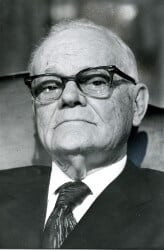
“I always know when I am speaking under the influence of the Holy Ghost because I always learn something from what I have said.”

“I always know when I am speaking under the influence of the Holy Ghost because I always learn something from what I have said.”

“The caring for the poor and the handicapped and those who need our help is a main purpose and an absolute requirement in fulfilling the royal law of loving our neighbors as ourselves. You will remember the great sermon of Amulek on prayer, in which he tells the people to pray and tells them how often to pray – morning, night, and noon – and tells them where to pray and how to pray and what to pray for. He goes into great detail and then he says that “after ye have done all these things, if ye turn away the needy, and the naked, and visit not the sick and afflicted, and impart of your substance, if ye have, to those who stand in need – I say unto you, if ye do not any of these things, behold, your prayer is vain, and availeth you nothing, and ye are as hypocrites who do deny the faith.”
| Conference Report, April 1978

“Partaking of the sacrament is not to be a mere passive experience.”
| Conference Report, April 1946, 39–40.

“Reverence is the soul of true religion. It’s seedbed is sincerity. Its quality is determined by the esteem in which one holds the object of his reverence as evidenced by his behavior toward that object. When that object is God, the genuinely reverent person has a worshipful adoration coupled with a respectful behavior toward him and all that pertains to him. The want of such appreciation or behavior smacks of irreverence. Order is a part of reverence. So is cleanliness of person, of apparel, of speech, of action, and of thought and impulse. So also are courtesy, respect for one another, and kindred virtues. Reverence is a sign of spiritual maturity, strength, and nobility.”
| Ensign, Oct. 1976, 2

“Latter-day Saints know that there is a God. With like certainty, they know that Satan lives, that he is a powerful personage of spirit, the archenemy of God, of man, and of righteousness. The reality of the existence of both God and the devil is conclusively established by the scriptures and by human experience.”
| “Satan —The Great Deceiver”

“No, the Lord doesn’t really need us to take care of the poor, but we need this experience; for it is only through our learning how to take care of each other that we develop within us the Christlike love and disposition necessary to qualify us to return to his presence.”
| “Living Welfare Principles,” General Conference, October 1981

“This is a very common means of revelation. It comes into one’s mind speaking words and sentences.”
| address to seminary and institute faculty, Brigham Young University, Provo, Utah, 8 July 1960, p. 10

“Mankind … must determine to travel in company with the one or the other. The reward for following the one is the fruit of the Spirit—peace. The reward for following the other is the works of the flesh—the antithesis of peace…The price of peace is victory over Satan.”
| Ensign, Oct. 1983, pp. 4, 5.

“I believe that, notwithstanding the fact the spirits of men, as an incident to mortality, are deprived of memory and cast out of the presence of God, there still persists in the spirit of every human soul a residuum from his pre-existent spiritual life which instinctively responds to the voice of the Spirit until and unless it is inhibited by the free agency of the individual.”
| Revelation (address to seminary and institute faculty, Brigham Young University, 8 July 1960), 6–7.

“Notwithstanding the fact that through its misuse, political, economic, and personal liberty are lost, free agency will always endure because it is an eternal principle. However, the free agency possessed by any one person is increased or diminished by the use to which he puts it. Every wrong decision one makes restricts the area in which he can thereafter exercise his agency. The further one goes in the making of wrong decisions in the exercise of free agency, the more difficult it is for him to recover the lost ground. One can, by persisting long enough, reach the point of no return. He then becomes an abject slave. By the exercise of his free agency, he has decreased the area in which he can act, almost to the vanishing point.”
| “The Perfect Law of Liberty,” Ensign, Nov. 1981, p. 45